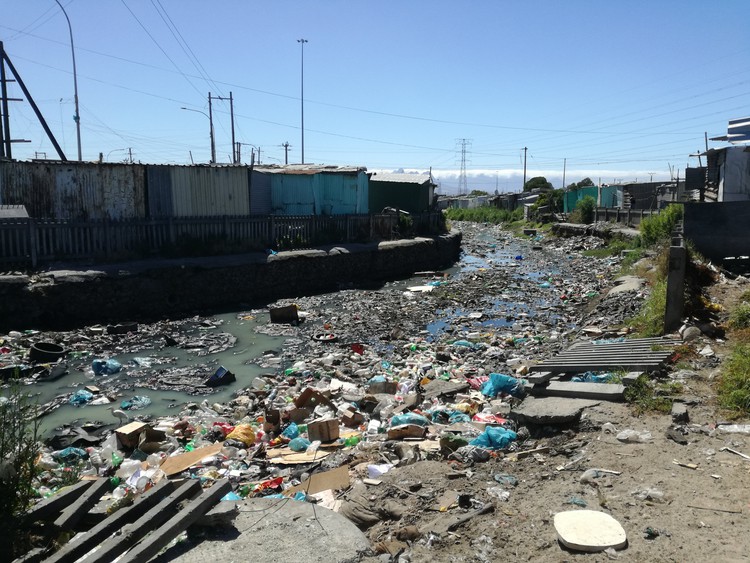Why do informal settlements get cluttered with litter?
UCT survey of Island in Khayelitsha provides some answers
Island, an informal settlement of Site C, Khayelitsha, has a river that is mostly blocked with litter, smells toxic and is a haven for rats. Some of the litter comes from passing traffic but a lot is dumped into the river by people who live there. Why does this happen?
As an informal area, Island residents are legally entitled to a door-to-door black bag system. The City of Cape Town has sub-contracted the cleaning service in this area to Masiqhame Trading 729 CC, which employs workers to collect two refuse bags per household per week and store the rubbish in shipping containers on the roadside which are emptied weekly by truck.
Yet according to a survey by the University of Cape Town (UCT), only 15% of residents in Island said that their rubbish was routinely collected in this way. This shows that there has been little improvement since the Social Justice Coalition (SJC) audited Khayelitsha’s refuse removal and area cleaning in 2013. The rest of the residents either took their rubbish directly to the containers (44%) or threw it in or near the river (41%).
Some residents blamed the cleaners for the littering, saying that because they were not from the area, they did not care enough to do a good job. People complained that the cleaners only went to some houses, refused to pick up bags of rubbish that had been broken open by dogs, or to visit households regularly. There was a lot of anger about the cleaning jobs not being given to people from Island itself. One respondent even suggested that littering was an act of protest, to “make more work for the cleaners” by dumping their rubbish.
Residents complained about not being provided with the two bags they were entitled to per week, meaning that rubbish could not be left outside in bags for collection or easily carried to the containers. Although, on average, most respondents in the survey reported receiving these two bags, they also highlighted that they often had to go to the cleaners at the containers to ask for them, and that two plastic bags were insufficient for larger households. Researchers were told that households facing a shortage of plastic bags would fill their bags with rubbish, empty them into the river and then use the same bags again. Another respondent highlighted how one’s plastic bags can get taken by neighbours if they are left outside while one is at work.
Finally, and possibly most importantly, is that rubbish containers are all positioned on the road side of the river and some are reportedly being misused. In email correspondence with Councillor Xanthea Limberg, the Mayoral Committee Member for Informal Settlements, Water and Waste Services, she said that a “single 6m shipping container services approximately 400 dwellings” and that the containers are placed by City officials on the basis of easy access for vehicles and cleaners.
For Island, this means that residents on the railway side of the river have a far longer walk to the containers than those on the road side where the containers are positioned. Unsurprisingly, the survey found that there were more people on the railway side dumping rubbish in the river than on the road side.
UCT researchers were also told that one of the Island containers does not operate at all because it has been taken over by car-washers in Govan Mbeki Road who use it to store their car-washing equipment. Some other containers are reportedly used by “drug-using youth” to sleep in, deterring residents from making use of the containers. The survey found that people next to this hijacked container chose to throw their litter in the river rather than confront the people in it – and that no one in the immediate vicinity criticised their neighbours for doing this.
Councillor Limberg confirmed that “at times the locks are broken and containers are vandalised” and said that the City therefore encourages contractors to use industrial-grade padlocks.
Masiqhame Trading said that their job was to clean the containers and that the misuse of the containers should be raised with “community leaders” instead. It seems that the proverbial buck is being passed between the City and the contractor, leaving frustrated Island residents without adequate sanitation services.
The result is a polluted river posing a threat to the environment and human health.
Support independent journalism
Donate using Payfast

Don't miss out on the latest news
We respect your privacy, and promise we won't spam you.
Next: Pietermaritzburg residents start cleaning blitz
Previous: Blikkiesdorp residents frustrated by housing delays
© 2018 GroundUp.
This article is licensed under a Creative Commons Attribution-NoDerivatives 4.0 International License.
You may republish this article, so long as you credit the authors and GroundUp, and do not change the text. Please include a link back to the original article.

